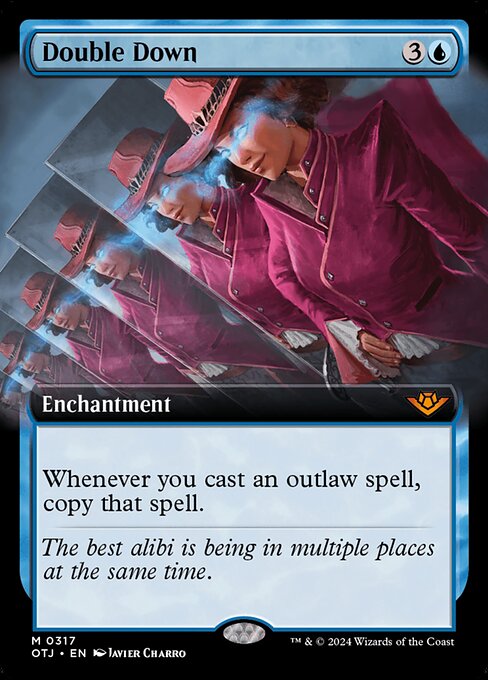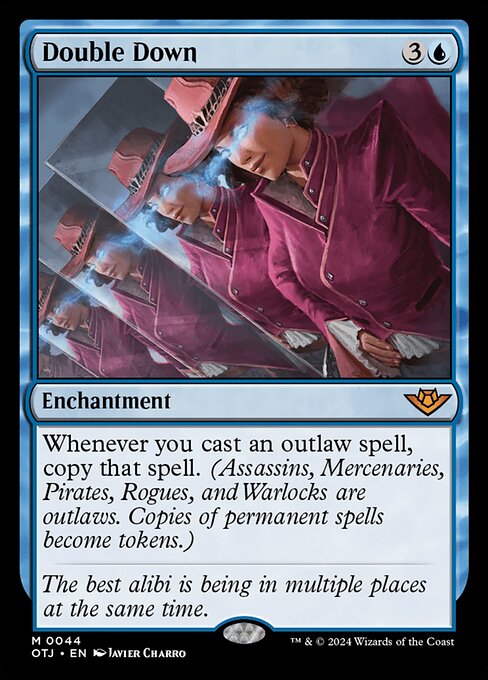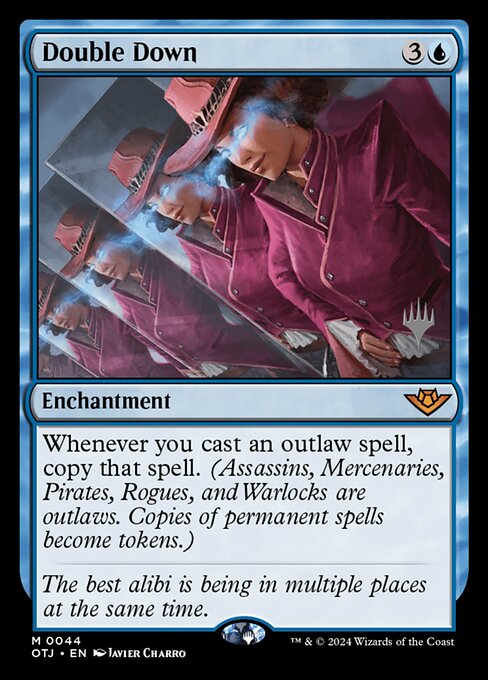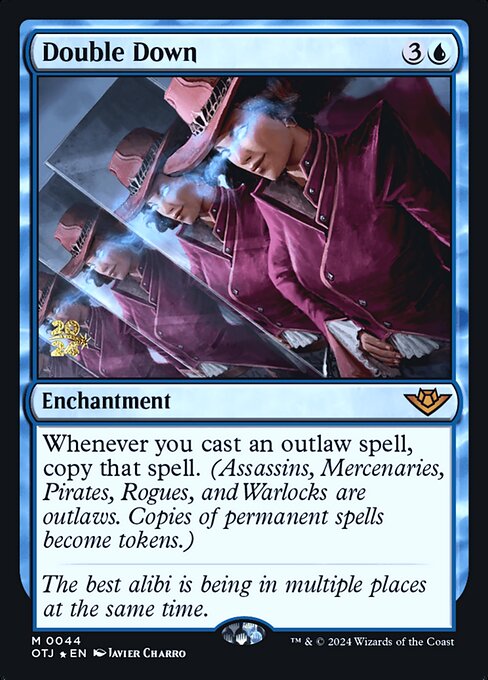standard
future
historic
gladiator
pioneer
explorer
modern
legacy
pauper
vintage
penny
commander
brawl
alchemy
paupercommander
duel
oldschool
premodern
Rulings
If an ability refers to an outlaw or whether a player controls an outlaw, it’s referring only to permanents with one or more of the creature types specified above. Notably, it’s not referring to any spell or card not on the battlefield. However, other abilities may refer to an “outlaw spell” or “outlaw card” in a zone other than the battlefield. Those abilities refer to spells and cards with one or more of the specified creature types.
Double Down’s ability and the copy it creates will resolve before the spell that caused it to trigger. They resolve even if that spell is countered.
The token that a resolving copy of a permanent spell becomes isn’t “created.” Abilities that refer to a token being created won’t interact with the copy resolving.
A card, spell, or permanent is an outlaw if it has the Assassin, Mercenary, Pirate, Rogue, or Warlock creature type. It doesn’t matter if it has more than one of those creature types; as long as it has at least one, it’s an outlaw.
As a copy of a permanent spell resolves, it’s put onto the battlefield as a token rather than putting a copy of the spell onto the battlefield. The rules that apply to a permanent spell becoming a permanent apply to a copy of a spell becoming a token.
Double Down’s ability doesn’t trigger if an outlaw permanent is put onto the battlefield without being cast.
Outlaw is not a creature type. If an effect asks you to choose a creature type, you can’t choose outlaw.
If a spell has the kindred card type and one of the outlaw creature types, Double Down will copy it. (“Kindred” is the new name of the card type previously known as tribal. Existing tribal cards will become kindred cards in a future Oracle update.)
Double Down’s ability and the copy it creates will resolve before the spell that caused it to trigger. They resolve even if that spell is countered.
The token that a resolving copy of a permanent spell becomes isn’t “created.” Abilities that refer to a token being created won’t interact with the copy resolving.
A card, spell, or permanent is an outlaw if it has the Assassin, Mercenary, Pirate, Rogue, or Warlock creature type. It doesn’t matter if it has more than one of those creature types; as long as it has at least one, it’s an outlaw.
As a copy of a permanent spell resolves, it’s put onto the battlefield as a token rather than putting a copy of the spell onto the battlefield. The rules that apply to a permanent spell becoming a permanent apply to a copy of a spell becoming a token.
Double Down’s ability doesn’t trigger if an outlaw permanent is put onto the battlefield without being cast.
Outlaw is not a creature type. If an effect asks you to choose a creature type, you can’t choose outlaw.
If a spell has the kindred card type and one of the outlaw creature types, Double Down will copy it. (“Kindred” is the new name of the card type previously known as tribal. Existing tribal cards will become kindred cards in a future Oracle update.)
Rulings
If an ability refers to an outlaw or whether a player controls an outlaw, it’s referring only to permanents with one or more of the creature types specified above. Notably, it’s not referring to any spell or card not on the battlefield. However, other abilities may refer to an “outlaw spell” or “outlaw card” in a zone other than the battlefield. Those abilities refer to spells and cards with one or more of the specified creature types.
Double Down’s ability and the copy it creates will resolve before the spell that caused it to trigger. They resolve even if that spell is countered.
The token that a resolving copy of a permanent spell becomes isn’t “created.” Abilities that refer to a token being created won’t interact with the copy resolving.
A card, spell, or permanent is an outlaw if it has the Assassin, Mercenary, Pirate, Rogue, or Warlock creature type. It doesn’t matter if it has more than one of those creature types; as long as it has at least one, it’s an outlaw.
As a copy of a permanent spell resolves, it’s put onto the battlefield as a token rather than putting a copy of the spell onto the battlefield. The rules that apply to a permanent spell becoming a permanent apply to a copy of a spell becoming a token.
Double Down’s ability doesn’t trigger if an outlaw permanent is put onto the battlefield without being cast.
Outlaw is not a creature type. If an effect asks you to choose a creature type, you can’t choose outlaw.
If a spell has the kindred card type and one of the outlaw creature types, Double Down will copy it. (“Kindred” is the new name of the card type previously known as tribal. Existing tribal cards will become kindred cards in a future Oracle update.)
Double Down’s ability and the copy it creates will resolve before the spell that caused it to trigger. They resolve even if that spell is countered.
The token that a resolving copy of a permanent spell becomes isn’t “created.” Abilities that refer to a token being created won’t interact with the copy resolving.
A card, spell, or permanent is an outlaw if it has the Assassin, Mercenary, Pirate, Rogue, or Warlock creature type. It doesn’t matter if it has more than one of those creature types; as long as it has at least one, it’s an outlaw.
As a copy of a permanent spell resolves, it’s put onto the battlefield as a token rather than putting a copy of the spell onto the battlefield. The rules that apply to a permanent spell becoming a permanent apply to a copy of a spell becoming a token.
Double Down’s ability doesn’t trigger if an outlaw permanent is put onto the battlefield without being cast.
Outlaw is not a creature type. If an effect asks you to choose a creature type, you can’t choose outlaw.
If a spell has the kindred card type and one of the outlaw creature types, Double Down will copy it. (“Kindred” is the new name of the card type previously known as tribal. Existing tribal cards will become kindred cards in a future Oracle update.)
Your collection? Your decks?
Want to manage your collection and/or create decks?


 0
0
 3.16€
3.16€


